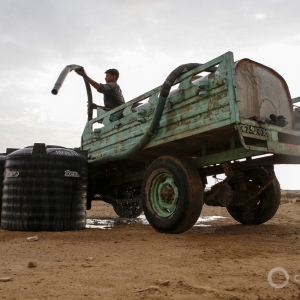Federal Water Tap, March 20: EPA Draft Proposal Expands Number of PFAS Regulated in Drinking Water
The Rundown
- The EPA targets six PFAS in its draft drinking water regulation.
- Representatives in Congress introduce water-related bills on Superfund, lead pipe removal, cybersecurity, and contaminated wells.
- A white paper investigates potential solutions to Rio Grande water deliveries.
- The Supreme Court will hear an influential case this week involving tribal water rights to the Colorado River.
And lastly, federal government officials will be traveling to New York this week for the UN Water Conference.
“Every water system I go to is really down on the numbers of people that are interested in working water. But also the retirements that we’re seeing across the board in the workforce is really putting a strain on our systems. So we need help there.” — Shelley Moore Capito (R-WV) speaking at a Senate committee hearing on implementing federal water infrastructure funding. Capito also said she has “concerns” about the Biden administration’s focus on environmental justice influencing how states spend their funding allocations.
By the Numbers
19 Percent: Portion of snow monitoring stations in the western United States where snow-water equivalent is below the long-term median. In other words, most snow stations are above normal, an indication of a healthy snowpack (at this point) in the western mountains.
News Briefs
PFAS Regulation
The U.S. Environmental Protection Agency took an initial step to control toxic “forever chemicals” in drinking water. The agency proposed first-ever limits for two of the chemicals, PFOA and PFOS. It also proposed regulating four additional forever chemicals as a group.
PFOA and PFOS would be capped at 4 parts per trillion, a miniscule level that is near the limit of reliable detection for monitoring equipment. PFNA, PFBS, PFHxS, and GenX would be regulated together under a “hazard index,” which is used for assessing the health risk of chemical mixtures.
Public health experts applauded the move, pointing to links between the chemicals and a range of illnesses, including thyroid problems, high cholesterol, and kidney cancer.
Water utilities, however, cautioned that it will be expensive to update water treatment equipment to remove the chemicals. They say that unless more is done to prevent contamination of rivers, lakes, and groundwater, the cost of meeting federal drinking water standards will be transferred to citizens.
The proposal is in draft form, and public comments will be accepted for at least 60 days. A final rule is expected next year.
Water Bills in Congress
Members of Congress introduced a passel of water-related bills in recent weeks. They are:
- The FLOW Act would make it easier for municipalities to use public money to completely replace a lead service line, including the portion that is on the homeowner’s property.
- The Water System Threat Preparedness and Resilience Act would authorize, for two years, a $10 million grant program to help water utilities pay membership dues in WaterISAC, a cybersecurity information and assistance network.
- The Florida delegation introduced a bill that would authorize the Land and Water Conservation Fund to be used for water quality improvement projects.
- House Republicans introduced their signature legislation for the session, the Lower Energy Costs Act. The bill includes language that would narrow the application of Section 401 of the Clean Water Act. States have used the section in recent years to reject fossil fuel projects.
- The bipartisan Healthy H2O Act would provide grant funding for low-income private well owners to test their water and install filtration systems. The bill would authorize $10 million annually over five years.
- The Preparing Superfund for Climate Change Act would require the EPA to consider the effects of a warming planet when deciding remedial actions for Superfund sites.
Studies and Reports
Rio Grande Water Deliveries
The International Boundary Water Commission, a federal agency that oversees water treaties with Mexico, released a white paper on water deliveries from the Rio Grande.
The report is intended to inform negotiations over a treaty amendment that will improve the reliability of Rio Grande water. Three times in the last three decades Mexico has failed to deliver its obligated amount of water to the river.
Environmental Review for Utah Copper Mine Expansion
Kennecott Utah Copper LLC, a division of the mining giant Rio Tinto, wants to expand a copper mine and its waste-holding pits. The Army Corps of Engineers will evaluate the environmental impacts of filling 44 acres of waters and wetlands at the site along the Great Salt Lake, about 10 miles west of Salt Lake City.
A draft report is expected in November with the final report anticipated in July 2024.
On the Radar
Tribal Water Rights at the Supreme Court
The Supreme Court will hear a case today with potentially broad influence for water use in the stressed Colorado River basin.
The Navajo Nation claims in Arizona v. Navajo Nation that the federal government has failed its legal duty to ensure sufficient water for the tribe. That includes claims to water from the Colorado River, which is adjacent to the Navajo reservation. The lawsuit asserts that the U.S. government must determine the Navajo Nation’s water needs and devise a plan to meet those needs.
A decision is expected in June.
UN Water Conference
March 22-24, the UN will host its first water conference since 1977, and several U.S. government officials will attend.
The delegation is headed by Deb Haaland, the Interior secretary, and Linda Thomas-Greenfield, the U.S. ambassador to the UN.
Also attending are deputies from the Department of Energy, Department of State, and U.S. Agency for International Development.
The purpose of the conference is to rally support for meeting the Sustainable Development Goals of safely managed water and sanitation for all.
Federal Water Tap is a weekly digest spotting trends in U.S. government water policy. To get more water news, follow Circle of Blue on Twitter and sign up for our newsletter.
Brett writes about agriculture, energy, infrastructure, and the politics and economics of water in the United States. He also writes the Federal Water Tap, Circle of Blue’s weekly digest of U.S. government water news. He is the winner of two Society of Environmental Journalists reporting awards, one of the top honors in American environmental journalism: first place for explanatory reporting for a series on septic system pollution in the United States(2016) and third place for beat reporting in a small market (2014). He received the Sierra Club’s Distinguished Service Award in 2018. Brett lives in Seattle, where he hikes the mountains and bakes pies. Contact Brett Walton







Leave a Reply
Want to join the discussion?Feel free to contribute!